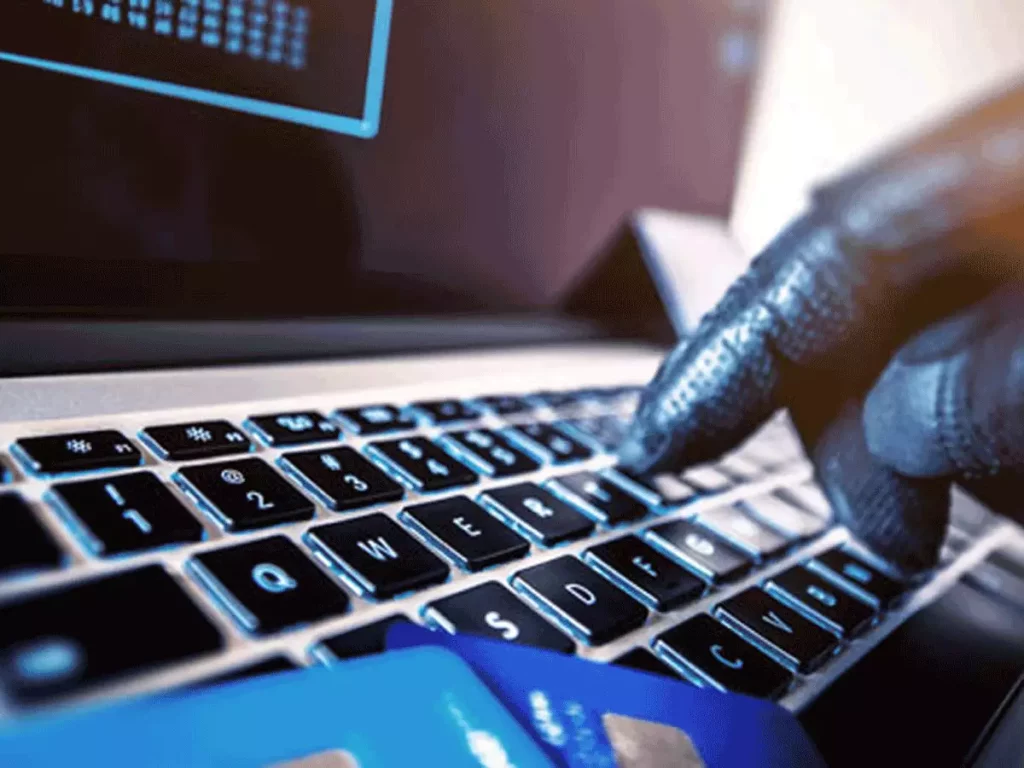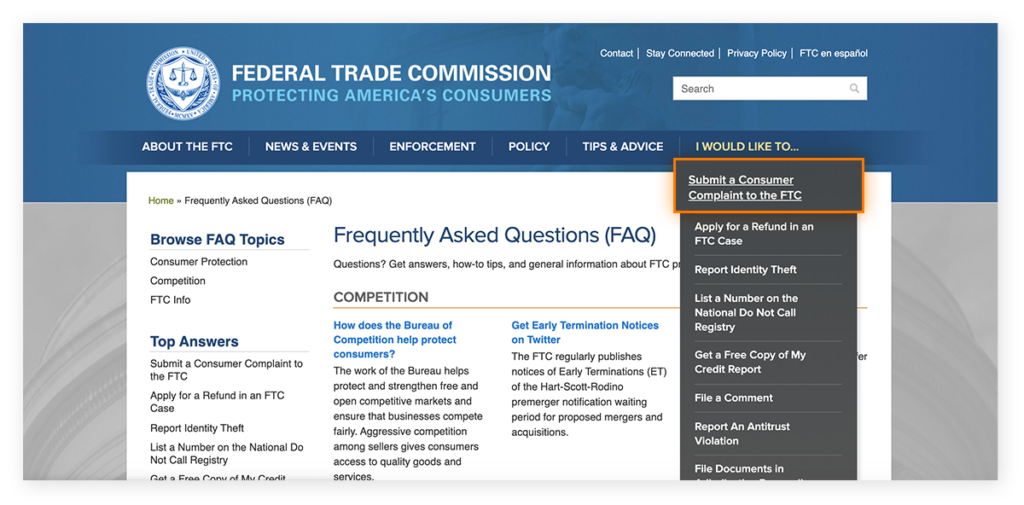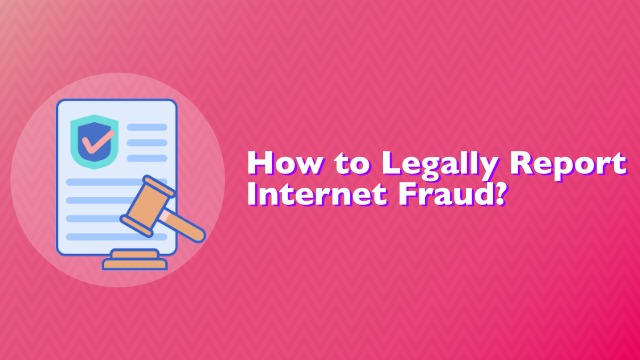Internet fraud has become rapidly prevalent in recent times, with scammers using various tactics to deceive and defraud unsuspecting individuals.
If you have fallen victim to internet fraud, it is important to take immediate action to stop further losses, gather information about the scheme and perpetrators, and report the crime to the appropriate authorities.
By following the steps outlined below, you can help track down the fraudsters, prevent others from being victimized, and seek justice for yourself.
Jump To ⇢
How to Legally Report Internet Fraud?
To report internet fraud legally, follow the below-given important steps to consider for safe and legal action.
1. Never Pay More Money
One of the first steps to take when you suspect internet fraud is to stop making any further payments. Some fraud schemes may try to convince victims to send additional fees or payments under the promise of large returns.
Legitimate brokers or service providers will not demand more money to release your earnings or principal. Refrain from paying any additional fees and cut off all communication with the fraudsters.
2. Collect information
While the details of the fraud are still fresh in your mind, gather as much information as possible about the scheme and the perpetrators. This information will be crucial when reporting the crime to the authorities.

Write down any conversations you had with the fraudsters, including dates and times. Keep any documents, emails, or messages related to the fraud. This evidence will help investigators in their efforts to track down the fraudsters.
3. Contact Your Financial Institution
If you have provided your financial information to the fraudsters, contact your bank or credit card company immediately.
Inform them about the fraudulent activity and ask them to freeze your accounts or take any necessary measures to prevent further unauthorized transactions. They may also be able to provide guidance on how to recover any lost funds.
4. Report the Fraud to Authorities
It is important to report internet fraud to the appropriate authorities as soon as possible. Depending on the nature of the fraud, you may need to report it to different agencies such as:

- Local law enforcement: Start by reporting the fraud to your local police department. Provide them with all the information you have gathered and any evidence you have. They will create a report and may initiate an investigation.
- Federal Trade Commission (FTC): The FTC is a government agency that handles consumer complaints and investigates fraudulent activities. File a complaint with the FTC through their website or by calling their toll-free number. The information you provide will help them track patterns of fraud and take appropriate action.
- Internet Crime Complaint Center (IC3): The IC3 is a partnership between the FBI and the National White Collar Crime Center. It accepts complaints related to internet crimes and forwards them to the appropriate law enforcement agencies. File a complaint with the IC3 through their website.
- Securities and Exchange Commission (SEC): If the fraud involves investment schemes or securities, report it to the SEC. They regulate the securities industry and can take action against fraudulent investment practices. File a complaint with the SEC through their website.
- Commodity Futures Trading Commission (CFTC): If the fraud involves commodity futures, options, or other derivatives, report it to the CFTC. They regulate the commodities and futures markets and investigate fraudulent activities. File a complaint with the CFTC through their website or by calling their toll-free number.
5. Legal Advice
Depending on the severity of the fraud and the amount of money involved, you may want to consult with an attorney who specializes in fraud cases.
They can provide guidance on your legal options, help you understand your rights, and assist you in recovering any lost funds.
Remember to recognize the signs of internet fraud, gather evidence, and report incidents to the appropriate authorities, such as local law enforcement agencies, the IC3, the FTC, financial institutions, social media platforms, ISPs, and CISA.
Read the following guide to detect and avoid online scams in the future.

SCAM ALERT – I went through the purchase process. The total was $6.95 according to the website the total was denied. I had $19.00 left in my account.
Since my bank immediately sends me notification if an online purchase is denied, I did receive notice that my account denied the purchase from the website below and stated that the actual amount attempted to be withdrawn from my account was actually $236.01 SEE THE WEBSITE BELOW THAT MADE THE SCAM ATTEMPT: https://superiorproductdesigns.com/fld-hexclad-ca-hp/checkout.php#vmodal
I can prove that uslarty.cc is a scam website. Its a fraud! Im a recent victim! Sadly it is still active even until now. The website offers large returns or profits for crypto trading however once you decided to withdraw even a portion of your asset, they will ask you to pay 10% of your total asset as service fee! Imagine if you have 50000 USD asset in your account, before you can withdraw a small amount from it they will ask you to pay the service fee of 5000 USD!
People should avoid that website! I hope it will be taken down soon!
Le site mainsseair est une arnaque. Ne payez rien, c’est hopeless.
Pictoverse.io ist betrug. Sie zahlen und zahlen, aber an ihr Geld kommen sie nicht!
Good day everyone. Plssss Do not trust this site, (MALL7788.COM) they are scammers, big time scammers, After investing your money to complete their order there is still another issue. you CAN’T withdraw both your capital and the commision UNLESS you pay another money which is 30% of the total amount of the money in your account, they called it UPGRADE TO LARGE AMOUNT CHANNEL by that time you’ll realize that you’ve already invested more than ONE MILLION, And 30% of 1 million is about 300k, So please do not entertain this Site MALL7788.COM Is a big Scam Channel or they’ll leave you broke as hell.
https://radzomo.com/product/transformcofftab/?v=f5b15f58caba
Acest site se ocupa cu înșelătorii, am comandat 3 produse identice acum trei luni și nici acum nu le au trimis, nu răspund la e mail sau orice altceva.
Valoarea produselor pe timpul ala 200 dolari
seoworksvip.top ,in my opinion, is to be avoided at all costs. It’s purported to be a sweat shop for promoting brands to keep them “on top” and visible to the public when searching online. Each “hit” you do on your 3 daily “tasks” of ~40 brands is supposed to generate a wage for you the user/ employee. Maybe that is legit, however, there is somehow a negative number that comes up that “must be paid” that they say you will “get it all back” when you cash out at the end of every day. that may be true as well. They like to use USDT as payment back and forth through LBank, although they also will use fiat money through WISE. They have different levels of trade V1; V2; V3; V4. V1 is easy to “buy” into and “you can make $100.00/ day, sometimes more, if you get a “merge””. They give you a “agent” I called my “handler” to guide you through the processes between your bank and WISE or LBank. They NEVER do the transactions YOU DO. They do not access you bank accounts, ONLY YOU DO THAT. I got persuaded by my agent to go to V2 because I was so proficient at the tasks and “you can make so much more” ,” why make hundreds when you can make thousands” she said. Well, I guess I have all the luck because I got “merges” left right and center when I “bought into” V2 level. Only problem is now, i’m maxed out at the bank catching up on these negative amounts that you have to honor before you can complete your daily tasks to the tune of about 3 grand “all of which you will be getting back at the end of your daily tasks”, she says. “you haven’t lost any money (it all shows on the screen), and “nobody can access it either” she says. Meanwhile, on Telegram and WhatsApp there is a customer service (CS) to line you up for your tasks (3 a day only) and transactions to various and sundry recipients, (crypto and otherwise), and also a chat group encouraging members to “work together” etc. “for the good of the whole”, they say. Well, i’m so tired, and broke of being so “lucky” with the merges, I could shit. They don’t screen you for these upper levels to make sure you have the resources behind you to keep up with the negative numbers along the way and say “YOU HAVE TO” complete these tasks in a timely manner to cash out at the end. If you cannot scrape vthe money together by days end to balance to zero, you have to apply for an “extension” on your tasks whic will last till the next day at 11:00 pm. (they start at 11:00 am and close at 11:pm EST). The pay can be excellent, if you can get it: it’s like they move the finish line the closer you get to crossing it. Well, I gotta call bullshit now, and have no idea of what the consequences will be for that. Likely, i will be out the 3 grand, which, lining on CPP, will take forever to pay back the banks. That’s if I don’t blow my brains out over it in the meantime. I would be happy just to make 1 or 2 hundred a day for an hours work on the puter every day, and told’em so. I tell them now “I can’t keep doing this, I can’t keep doing this”. All they say is, “you HAVE TO finish your tasks”. Looking above here it looks exactly like “MALL7788.com”
Cryptobbit.net trading platform is a scam platform that let you deposit funds and of course to trade, but then when you want to withdraw some of your profit you must pay upfront 20% of your total asset. In my case us750k would cost me us150k withdrawal fee.
Then I am not allowed to withdrawal my initial funds I deposited on my platform for trading without paying hefty fee for my own money.
I belive now if I pay any fees to collect the profit or my own money that would be lost as much as I lost the lot. CRYPTOBBIT.NET IS 100% SCAM
My complaint is against CHNLOVESKY.COM . The persons name on there is Mengqian. She is a con artist and drew me along for a couple of years. She had me paying for both of our times on the website. Plus I bought her many gifts and such in which each one costs at least 200.00. Her excuse for me to pay is that she could not get a credit card. Although she owned 2 companies and a lot of real estate. I’m out about $6000.00. Probably more. My suggestion to you is to stay away from this and other web sites like it. They are no good for anyone.
Just an update to my previous letter. “Mengqian” is a younger chinese girl. She is actually older than she says. All the wealth she insists she has is actually a false claim. She would use her parents as a means to justify what she does. She is nothing more than evil. My impression is that she is just another poor chink who has nothing better to do. Don’t fall for it. If they have an age range of 18-90, don’t do it. They, and she lies about what their job is. As it turns out, everything they say is a lie. And it includes why they can’t come to see you in your country. It’s ALL B.S. She is on other web sites also. Again, stay away.
PAP pam 1668.com is a scam i was s camed $4000 recently now as am speaking its shut down i cant have access not even to the customer service i wish i knew i couldnt have invested my money i do have conversations as proof between myself and the recruiter and the the service provider
https://flipknas.com
Guys this is a scam. They just start to ask you to invest from small amounts. When you are in their tricks they ask you to invest more or spend more money to complete the purchase. My personal experience is that avoid these mosquitoes.
Situs mm.planetwqa.com adalah situs penipuan, dimana uang yg dideposit tidak bisa diwithdraw.. saya ditipu oleh Maureen Wijaya di fb
https://tkshop.name/#/
This website has been identified as a scam. It claims to offer a work from home setup, where applicants can easily get hired without the review of their qualifications. The company does not request proof of employment, even when seeking experienced candidates. Once hired, new employees are asked to register on the website and then apply to become a store owner. They are then assigned products to sell. On the second day, the products go live and orders begin to come in. The company claims that all marketing will be handled by a professional team. The job is similar to dropshipping, and employees are provided access to a supplier platform. Employees must search for products in the supplier platform and input customer information upon receiving orders. After generating a high number of sales daily, they are offered the opportunity to have their own store, with the company providing a $1,000 USD startup benefit and $100,000 USD for marketing over a year, with restrictions on external marketing. If the employee decides to get another store, they must register for a new account and get provided products to sell. Once a high number of orders come in, depleting the initial benefit, the employee may be tempted to recharge the account. If they do not, the company will disappear, operating only through Telegram. This is how the website operates as a scam.
I deposited $3000 in uu11199.com and trying to withdraw today but couldn’t withdraw any amount and I sent to them but didn’t respond to me yet, the process seems like a scam to me since I passed through all this issues in the uu11199.com USDT website.. please I need help to report to them to approve my withdrawal to be successful..
Defuny is the latest scam online. You invest in ‘liquidity pools’ on the crypto market, and supposedly get ‘DFN tokens’ daily by doing simple tasks on your phone. These ‘DFN tokens’ can be converted to Usdt, the crypto equivalent of Usd. But when you want to withdraw your Usdt from the platform, they’ve placed something called ‘Anti-witch verification’, that you have to do, at a cost of 25Usdt, which cannot be directly debited from your Defuny account (even though it has sufficient balance to make the 25Usdt payment), but you must inject it from elsewhere (of course from your bank account or other sources).
Total scam
gdmalle.com là trang web e-commecial lừa đảo,nó dụ dỗ đăng ký mở cửa hàng trên nền tảng và sau đó bạn sẽ không thể rút tiền ra khỏi ví của mình, tôi đã mất 11000 USD ở đây, tôi đưa lên đây để cảnh báo vì thấy điểm của nó tăng, nhưng nó là trang lừa đảo, tôi đã tố cáo FBI hành vi của nó
gdmalle.com is a scam e-commecial website, it lures you to register to open a store on the platform and then you will not be able to withdraw money from your wallet, I lost 11000 USD here, I posted it here as a warning because I saw its score increase, but it is a scam site
Trang web blockgroupex.com là một trang lừa đảo, đây là trang giao dịch mua bán coin. Vừa qua tôi khg thế rút tiền ra được và web đã đóng lại